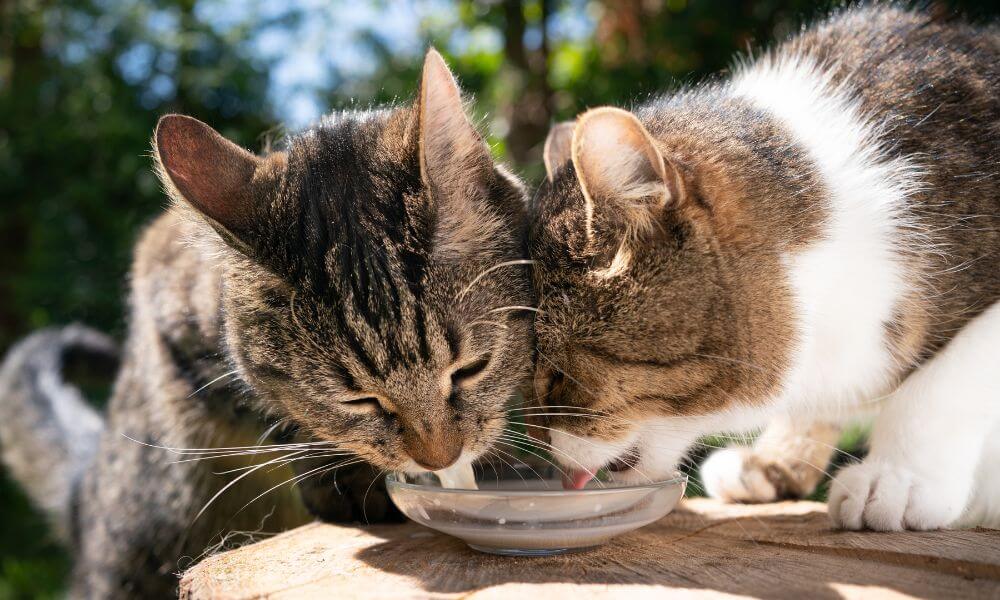Despite the very common image of cats enjoying milk, the truth is that in later life it isn’t always the best option for them.
In any case, goat’s milk should only ever be a substitute to a healthy diet, making up a very small part of the overall diet.
Cats, after all, are carnivores, and goats are herbivores.
Their diets are very different, and goat’s milk is really formulated for baby goats.
With all that in mind, let’s consider the health benefits of goat’s milk for cats.

What does goat’s milk do for my cats?
Well, to begin with, it is worth mentioning what goat’s milk lacks that you would find in the milk of a cat or a dog.
Goat’s milk contains less than half the fat of dog and cat milk, less than half the protein, the calcium and phosphorous content is significantly lower and, most importantly, the lactose content in goat’s milk is significantly higher.
This can cause diarrhea and dehydration if your cat has lactose intolerance, which is very common.
That said, there are benefits for your cat to drinking goat’s milk.
Raw goat’s milk provides increased moisture intake, which can actually aid digestion.
Furthermore, raw goat’s milk is packed with probiotics which also help digestion.
Dogs and cats both love the taste of goat’s milk and it will go down as a very popular treat.
This is all the more reason to be careful of moderation, but your cat will definitely love it.
It can be given intermittently, or in small amounts, it makes a great topper for their ordinary food.
Some cats can be very picky eaters, and goat’s milk will help entice them to eat.
Is it safe to give cats goat’s milk?
This will very much depend on a case-by-case basis.
As I mentioned, lactose intolerance is very common in weaned cats.
The only animal that drinks milk habitually beyond a very young age is humans.
So, we’re kind of unusual in that sense.
It isn’t surprising, then, that many animals including us suffer very commonly from lactose intolerance.
Lactose intolerance occurs when the enzyme needed to break down lactose is not retained into adulthood or is only retained in small amounts.
Goat’s milk is high in lactose (although not quite as high as cow’s milk), so feeding it to a lactose-intolerant cat will cause several issues.
Digestive discomfort will be the first one.
Your cat’s stomach will hurt, and this may lead to diarrhea and gas.
If you ever observe this after giving your cat goat’s milk or any milk, stop giving it milk immediately.
Your cat is likely lactose intolerant.
As I said, though, lactose intolerance can vary a lot between individuals.
It might simply be that they drank too much goat’s milk, and could tolerate small amounts.
If your cat seems very sick after drinking goat’s milk, don’t give them anymore.
If you are feeding kittens, you are really best just buying formulated kitten milk.
It will contain everything they need and won’t make them sick, which will be much better for their growth and development.
| Related Articles |
|---|
Should I give pasteurized or unpasteurized milk to my cat?
Most milk that we buy in supermarkets today is pasteurized.
This means it is passed through a heating process before reaching shelves, which clears it of harmful bacteria and hormones fed to the milking creatures before they are harvested.
If you want to feed milk to your cats, you must feed them raw milk.
During the process, the protein in the milk changes and homogenized milk will leak into your cat’s gut, causing all sorts of troubles.
Processing is a big part of how we eat.
Cats, on the other hand, really need raw food.
They would prefer raw, wet food as well to dry food.
Milk, too, should never be fed to them pasteurized; it should always be raw.
This can be harder to find in supermarkets, so you may have to visit a market or a specialized pet store.
The bottom line is you need to be careful with feeding milk to your cats.
Milk is not a staple of any wild animal’s diet, so it should be fed in very careful moderation.
So, in the case that your cat does enjoy goat’s milk and doesn’t suffer any digestive issues, it’s still essential that you feed them goat’s milk in moderation.
Too much will start to cause problems very quickly.
Milk wouldn’t be a staple of their diet in the wild, and goat’s milk in particular, as I mentioned, is the milk of an herbivore; it won’t have all the necessary nutrients that a carnivore needs.
Nonetheless, in the correct amounts, it makes a great treat for your cat.
